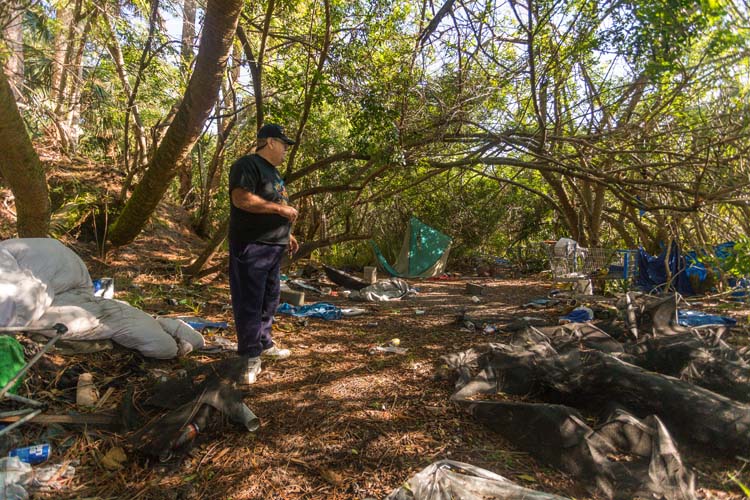
Tim Nightingale and Vic Diaz, co-founders of Vietnam Veterans of Indian River County, went into the woods last week looking for homeless vets to get them signed up for services and into housing. They did not find any.
The homeless “point-in-time” count last January identified 29 homeless veterans in the county, but sheriff’s deputies recently rousted the vets and other homeless people out of their camps, making them more difficult to locate.
“They’re cracking down more because real estate is at a premium again,” said Diaz.
Two weeks ago, Diaz and Nightingale had better luck, locating and bringing in fellow Vietnam veteran Danny Wagoner, signing him up for medical services and a pension, and giving him a bed in one of the three houses they have built for homeless vets with the help of Every Dream Has a Price.
He had been living in wooded areas around Vero for 30 years.
Originally from Melbourne, Wagoner was drafted in 1972 when he was 18. He signed up for the Navy to avoid the Army. As a radio operator he didn’t see much action, but his life fell apart anyway when he got back in the states. He lost his job, wife, children, house, cars, “everything.”
“In 1985 I moved into the woods,” Wagoner said. “I lived off the land, trapping or shooting raccoons, squirrels, possums, but no armadillo.” They carry diseases, he said.
In one of his latest camps, where he lived with others, “We had everything, solar panels, a dock to fish off of, and running water.”
Then, about three weeks ago, the camp was discovered by sheriff’s deputies and he was arrested for trespassing, spending 20 frightening days in jail.
He had lived in the woods with a fellow veteran for three years, and he knew that Nightingale and Diaz had found that vet a place to live, so he asked them for help.
Wagoner said he had no idea he might be eligible for veteran benefits. “It never occurred to me.”
Living now in a house with nine other veterans “is different. There are a lot of rules, but they make sense.”
It’s not societal rules that prevent many veterans from coming in from the woods, Nightingale and Diaz said. It’s a mistrust of authority.
“They’ve been rousted out of so many places, instead of being asked if they need help,” Nightingale said.
Another pair of veterans – Doy Demsick and Patrick Williamson – who teamed up to help with last week’s effort, which was coordinated by the Treasure Coast Homeless Services Council, found two homeless veterans during the search, but those men preferred to remain in the woods.
The outreach search revealed numerous abandoned camps, including the one where Wagoner lived before his arrest, with tents slashed, and all worldly goods left behind in a hurry. “It’s likely the sheriff’s office split the tents so they can’t come back,” Nightingale said.
Besides police, the Veterans Administration has contributed to the mistrust felt by homeless vets, Diaz said.
Nightingale, who suffers from post-traumatic stress disorder, among other disabilities, would have given up re-applying for veterans’ benefits after being turned down several times, but Diaz helped him persevere. It took eight years for the Veterans Administration to acknowledge Nightingale’s disabilities.
Now, he and Diaz help other veterans whose problems and needs are disbelieved or dismissed.
“We try to keep them connected so at least they are talking with somebody,” Nightingale said. “They don’t have a permanent address so we use our office address. When a notification comes in, we usually know where they are in the woods.”
“We had a vet who was part of Black Hawk Down with PTSD. He was denied, denied, denied,” Diaz said. “We demanded they reopen his case.”
Two years later, he’s back at work, back in the bosom of his family, and is “paying it forward,” Diaz said, pointing to a car the veteran just donated to his fellow veterans.
After years of fighting locally for Vietnam Veterans’ disabilities pensions, healthcare and housing, Diaz said, “It is getting better. Let’s just say we help the VA correct their errors. Palm Beach is recognizing what we do is right and has started to send their vets to us.”
There will be more beds soon to accommodate them. Diaz and Nightingale’s organization just bought three more lots where they plan to build more houses for veterans. They depend mainly on private donations to perform their work.



